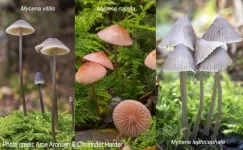(Press-News.org) Since the outset of the COVID-19 pandemic, 10 to 30 per cent of the general population has experienced some form of virus-induced cognitive impairment, including trouble concentrating, brain fog or memory loss. This led a team of researchers to explore the mechanism behind this phenomenon and pinpoint a specific protein that appears to be driving these cognitive changes.
A new study published in Nature Immunology, led by researchers at Western and Washington University School of Medicine in St. Louis, Missouri, also looked at how vaccination may help reduce the impacts of memory loss following COVID-19 infections.
The research team, including Schulich School of Medicine & Dentistry professor Dr. Robyn Klein, who joined Western from Washington University used rodent models to better understand how COVID-19 impacts cognitive impairment.
“We looked carefully at their brains during acute infection and then later after recovery to discover what was abnormal in terms of the different immune cells trafficking into the brain and their effects on neural cells,” said Klein, who holds the Canada Excellence Research Chair in Neurovirology and Neuroimmunology.
Klein said she was concerned by reports of cognitive impairment in the early days of the pandemic, which led researchers to question whether the virus was invading the central nervous system.
Klein’s previous work studied viruses that invade the brain.
“We had previously shown that the virus could not be detected in human or hamster brains, and this study also showed that the virus was not invading the central nervous system,” said Klein. The finding means some other mechanism is leading to cognitive impairment.
The team identified SARS-CoV-2 infection increased levels of brain Interleukin-1 beta (IL-1β), a cytokine protein that impacts the immune system. The team observed that the models with increased levels of IL-1β experienced loss of neurogenesis, the process by which new neurons are formed in the brain, and also displayed memory loss.
Vaccination reduces cognitive symptoms
The team concluded IL-1β was one potential mechanism driving SARS-CoV-2-induced cognitive impairment, and wondered whether this may be prevented by vaccination.
Researchers then investigated how vaccinated models were impacted. They found a promising correlation between vaccination and reduced cognitive impairments like memory loss.
The researchers showed that prior vaccination reduced inflammation of the brain and lowered levels of IL-1β. As a result, the vaccinated models experienced less of an impact on memory and brain function.
Klein says there is still more work to be done to fully understand how vaccinations are achieving this result, and whether it will translate to humans.
“We know there’s anecdotal evidence that humans who’ve been vaccinated have a much lower risk of developing this long COVID brain fog,” said Klein.
The vaccine used in the study is not the same as the vaccines available to people, Klein stressed, meaning more studies will need to be conducted to further investigate the connection between vaccination and reduced long COVID impacts.
“What we do know is that if you’re vaccinated you have much less inflammation,” said Klein.
Vaccination is about lowering the risk of the impacts of infection, not completely preventing infection, she added. For example, a vaccine can protect individuals from developing severe pneumonia, but that doesn’t mean it completely protects against pneumonia.
The same is likely true for cognitive impacts.
“People need to understand that about vaccines,” Klein said. “They need to know what vaccines can do and what they can’t do.”
END
Vaccination may reduce memory loss from COVID-19 infections
Western professor Dr. Robyn Klein collaborated on study pinpointed a specific protein that appears to be driving memory loss associated with COVID-19
2024-06-27
ELSE PRESS RELEASES FROM THIS DATE:
Prenatal exposure to ethylene oxide associated with lower birth weight and head circumference in newborns
2024-06-27
A study led by the Barcelona Institute for Global Health (ISGlobal), a centre supported by the "la Caixa" Foundation, provides new evidence on the adverse effects of prenatal exposure to ethylene oxide (EO) on foetal development. The results, published in Epidemiology, show that increased EO exposure in utero is associated with a reduction in birth weight and head circumference in newborns.
Ethylene oxide is a chemical used in various industrial processes and in hospitals, is known for its ...
Archaeology: Occupational hazards for ancient Egyptian scribes
2024-06-27
Repetitive tasks carried out by ancient Egyptian scribes — high status men with the ability to write who performed administrative tasks — and the positions they sat in while working may have led to degenerative skeletal changes, according to a study published in Scientific Reports.
Petra Brukner Havelková and colleagues examined the skeletal remains of 69 adult males — 30 of whom were scribes — who were buried in the necropolis at Abusir, Egypt between 2700 and 2180 BCE. They identified degenerative joint changes that were more common among scribes compared to men with other occupations. These were in the joints connecting the lower jaw to the skull, ...
To protect corals from summer heatwaves, we should help their microbial symbionts evolve heat tolerance in the lab, researchers say
2024-06-27
Most coral reef restoration efforts involve restocking reefs with nursery-grown corals. However, if these corals are of the same stock as their wild counterparts, they will be equally vulnerable to the heat stress that caused the bleaching event in the first place. In a review publishing June 27 in the journal Trends in Microbiology, researchers discuss the potential of improving corals’ chances by inducing the evolution of heat tolerance in their symbionts—the mutualistic microbes that provide corals with nutrients in ...
Geographic disparities in head and neck cancer mortality and place of death
2024-06-27
About The Study: Rural residents with head and neck cancer experienced higher mortality rates and less annual improvement compared to urban counterparts in this cross-sectional study. Multilevel barriers may explain the widening rural-urban mortality gap, including alcohol and tobacco use and lower human papillomavirus (HPV) vaccination rates.
Corresponding Author: To contact the corresponding author, S. M. Qasim Hussaini, M.D.,M.S., email shussaini@uabmc.edu.
To access the embargoed study: Visit our For The Media website at this link https://media.jamanetwork.com/
(doi:10.1001/jamaoto.2024.1650)
Editor’s Note: Please see the article ...
Suicide mortality during the perinatal period
2024-06-27
About The Study: This study provides insights into complex factors surrounding maternal suicide, and it highlights opportunities for further research to understand long-term consequences of perinatal mental health. These findings also underscore the need for targeted evidence-based interventions and effective policies targeting mental health, substance use, and intimate partner problems to prevent maternal suicide and enhance maternal health outcomes.
Corresponding Author: To contact the corresponding author, Kara Zivin, Ph.D., M.S., M.A., M.F.A., email kzivin@umich.edu.
To access the embargoed study: Visit our For The Media website at this ...
The mechanism behind melanoma resistance to treatment
2024-06-27
In many cases of malignant melanoma, the effect of targeted treatment is lost over time. A research team from UZH and USZ has now discovered that a factor secreted by tumor cells is responsible for the resistance. These findings could pave the way for more effective therapies.
Malignant melanoma is one of the most aggressive types of cancer. Despite recent progress in effective therapies, the tumors of many patients are either resistant from the outset or become so during the course of treatment.
“It is therefore crucial to understand the mechanism ...
Research shows how common plastics could passively cool and heat buildings with the seasons
2024-06-27
Researchers at Princeton and UCLA have developed a passive mechanism to cool buildings in the summer and warm them in the winter.
In an article published June 27 in the journal Cell Reports Physical Science, they report that by restricting radiant heat flows between buildings and their environment to specific wavelengths, coatings engineered from common materials can achieve energy savings and thermal comfort that goes beyond what traditional building envelopes can achieve.
“With the increase ...
Study supports precision radiation therapy in lung cancer
2024-06-27
HOUSTON ― Results from a new study led by researchers at The University of Texas MD Anderson Cancer Center support standard use of the more precise intensity-modulated radiotherapy (IMRT) over the alternative 3D-conformal radiotherapy (3D-CRT) for patients with unresectable, locally advanced non-small cell lung cancer (NSCLC). The study, published today in JAMA Oncology, revealed fewer side effects with IMRT, with similar survival outcomes.
A prospective secondary analysis of long-term outcomes from 483 patients on the Phase III NRG Oncology-RTOG 0617 randomized trial demonstrated ...
These mushrooms have “massively expanded” genomes to make them more adaptable to multiple lifestyles
2024-06-27
A study of multiple Mycena mushroom species reported in the journal Cell Genomics has found that they have unexpectedly large genomes. While the mushrooms had been thought to be purely saprotrophic – living by degrading dead organic material alone – the discovery suggests that they may instead have a collection of genes to enable them to adapt to different lifestyles as circumstances change. Interestingly, they show certain Mycena strains living in the Arctic have some of the largest mushroom genomes ever described.
These mushrooms show widespread growth across their genome. This includes not only the genes that help them invade or interact ...
AAAS and BII inaugurate new prize recognizing translational achievements in women’s health
2024-06-27
In collaboration with the BioInnovation Institute (BII), AAAS is announcing the establishment of the BII & Science Translational Medicine Prize for Innovations in Women’s Health. Submissions are now open for the first year of the prize, which will be awarded in 2025.
The new award will aim to recognize and elevate scientists who have made outstanding research discoveries that have translational potential to impact women’s health around the world.
Relevant research topics include, but are not limited to, investigation into maternal health and gynecological conditions, areas of ...
LAST 30 PRESS RELEASES:
Study reveals insights about brain regions linked to OCD, informing potential treatments
Does ocean saltiness influence El Niño?
2026 Young Investigators: ONR celebrates new talent tackling warfighter challenges
Genetics help explain who gets the ‘telltale tingle’ from music, art and literature
Many Americans misunderstand medical aid in dying laws
Researchers publish landmark infectious disease study in ‘Science’
New NSF award supports innovative role-playing game approach to strengthening research security in academia
Kumar named to ACMA Emerging Leaders Program for 2026
AI language models could transform aquatic environmental risk assessment
New isotope tools reveal hidden pathways reshaping the global nitrogen cycle
Study reveals how antibiotic structure controls removal from water using biochar
Why chronic pain lasts longer in women: Immune cells offer clues
Toxic exposure creates epigenetic disease risk over 20 generations
More time spent on social media linked to steroid use intentions among boys and men
New study suggests a “kick it while it’s down” approach to cancer treatment could improve cure rates
Milken Institute, Ann Theodore Foundation launch new grant to support clinical trial for potential sarcoidosis treatment
New strategies boost effectiveness of CAR-NK therapy against cancer
Study: Adolescent cannabis use linked to doubling risk of psychotic and bipolar disorders
Invisible harms: drug-related deaths spike after hurricanes and tropical storms
Adolescent cannabis use and risk of psychotic, bipolar, depressive, and anxiety disorders
Anxiety, depression, and care barriers in adults with intellectual and developmental disabilities
Study: Anxiety, gloom often accompany intellectual deficits
Massage Therapy Foundation awards $300,000 research grant to the University of Denver
Gastrointestinal toxicity linked to targeted cancer therapies in the United States
Countdown to the Bial Award in Biomedicine 2025
Blood marker from dementia research could help track aging across the animal world
Birds change altitude to survive epic journeys across deserts and seas
Here's why you need a backup for the map on your phone
ACS Central Science | Researchers from Insilico Medicine and Lilly publish foundational vision for fully autonomous “Prompt-to-Drug” pharmaceutical R&D
Increasing the number of coronary interventions in patients with acute myocardial infarction does not appear to reduce death rates
[Press-News.org] Vaccination may reduce memory loss from COVID-19 infectionsWestern professor Dr. Robyn Klein collaborated on study pinpointed a specific protein that appears to be driving memory loss associated with COVID-19



